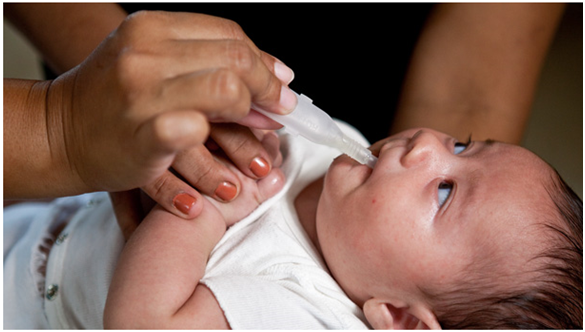Beyond oral vaccines – exploring novel routes to protect against rotavirus
|

You are a new parent. Your infant daughter is nine weeks old today. She has just begun to coo, and she smiles in recognition when you greet her each morning.
Your little one is a healthy eater, hungry and eager. The antibodies in her mother's milk go a long way in protecting her growing belly, but strong as they are, they don't quite match many threats looming near her still-sensitive system.
You live in a rural village of a poor country. Some days, you gather water from a distant, deep well tapped into a fresh spring, but more often than not, you rely on the muddy river closer to home. Washing your hands with this brackish brew—and without soap—seems an exercise in futility, but you have learned it is an important example to set for your children. Your family does not have a toilet, rather a rudimentary pit latrine dug years ago, never emptied, never cleaned. This is your baby's world, too; where she learns by sounds, scents… also touch and taste. Her tiny tummy barely stands a chance.
Though the nearest health center is a 3-mile walk, you have diligently brought your little girl in for each recommended vaccination, including the new rotavirus vaccine, which nurses have assured you will help protect her from the most dangerous diarrhea infections. But the vaccine is not a magic bullet. It will not remove all threats in your daughter's daily environment. And with the challenges of ever-present bacteria, viruses, and persistent malnutrition, her tiny system may be too vulnerable to fully reap the vaccine's protective benefits.
Rotavirus vaccines have already saved thousands of lives, even in places where environmental factors and existing gastrointestinal vulnerabilities limit their potential. They are an essential element of strategies to control deadly diarrhea around the world. But the current vaccines often face an uphill battle in poor, less developed settings. They are administered orally, sent right to the gut, and can struggle to impart their lifesaving benefits to children whose stomachs and systems are weakened by malnutrition or constantly fighting other belly bugs.
Could an injected rotavirus vaccine be the next step? PATH is investigating non-replicating rotavirus vaccines (NRRV) to find out. Because they are not administered orally, NRRVs would not pass through the digestive tract, thus avoiding gastrointestinal factors that may be the culprit of reduced efficacy of live, oral vaccines in low-income settings. This novel approach is in early stages, with clinical studies of one candidate ongoing, and others planned for the near future.
NRRVs also are projected to be easier to manufacture and could cost less than the current vaccines. Also, if they are administered via the same route as current routine vaccines, they could theoretically be combined, further reducing costs and helping ensure uptake. Of course, this could only follow pivotal studies to ensure the NRRV addition would not affect the performance of other vaccines. But the studies underway are an important first step to realizing these potential extra benefits.
In the meantime, research on the current oral rotavirus vaccines is helping pin down the reasons for their reduced performance in developing countries. These vaccines are powerful tools that are making dramatic impact, but we want to know if and how they can save even more lives in the communities where children are most vulnerable. We're also working with developing country manufacturers on additional live, oral rotavirus vaccines to address strains of the disease most common in Asia and Africa, as well as to help keep pace with the global market by increasing available supply and driving down cost through competition.
All parents deserve the chance to give their children a healthy start. PATH and our partners are helping them get there through research into novel ways to protect from deadly diarrhea, alongside investigation into improving today's tools, added to partnerships that ensure rotavirus vaccines reach all children.
For more information:
-- PHOTOS: Vaccines are foundational to child health.














